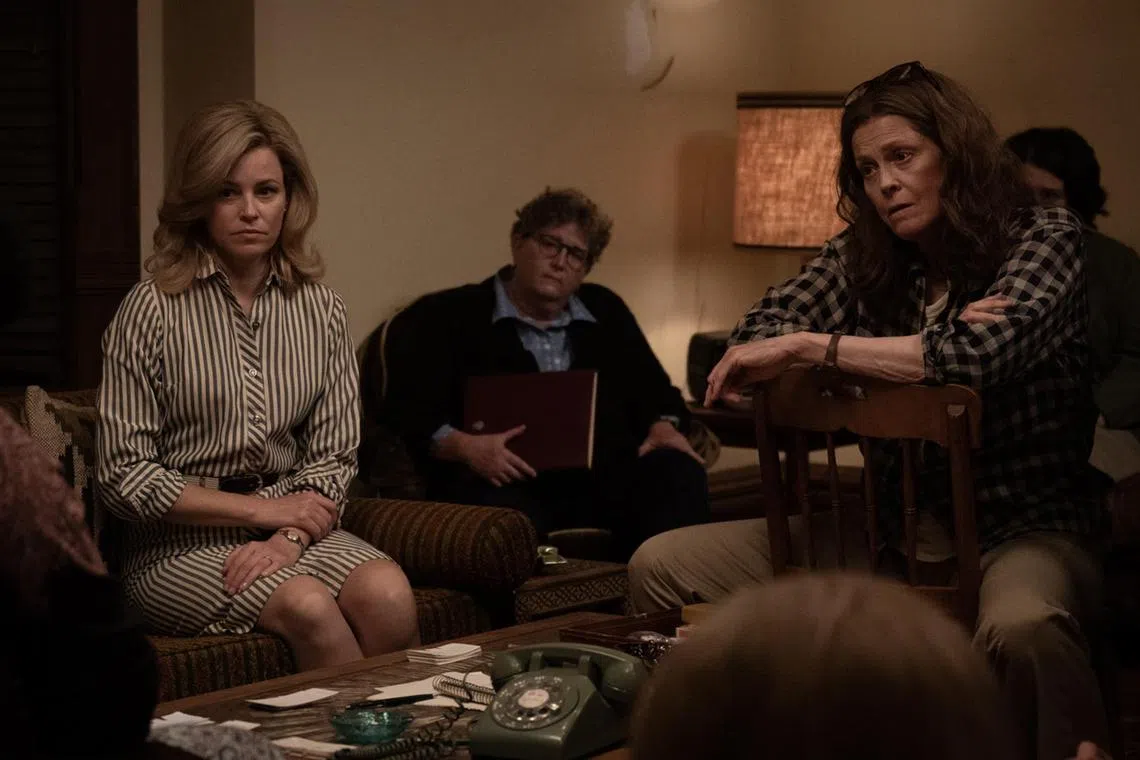Abortion film Call Jane even more timely after Roe v Wade overturning, says star Elizabeth Banks
Sign up now: Get ST's newsletters delivered to your inbox

The movie Call Jane is a reminder of what it was like trying to get an abortion in the United States in the 1960s.
PHOTO: SHAW ORGANISATION
Follow topic:
LOS ANGELES – It is something women in many parts of the world take for granted today.
But the movie Call Jane is a reminder of what it was like trying to get an abortion in the United States in the 1960s – a timely topic given that the US Supreme Court overturned a ruling enshrining that right in June 2022.
Opening in Singapore cinemas on Thursday, the drama film stars Elizabeth Banks as a housewife faced with a life-threatening pregnancy in 1968 – five years before the court ruled in favour of the right to have an abortion in Roe v Wade.
Speaking at an event in Los Angeles, American actress Banks and co-star Sigourney Weaver say the story is even more relevant in the wake of the divisive Dobbs v Jackson case in 2022, which saw the Supreme Court overrule Roe v Wade and give individual states the power to restrict access to abortion once again.
Banks, the 49-year-old producer of the Pitch Perfect musical comedy films (2012 to 2017) and star of The Hunger Games science-fiction franchise (2012 to 2015), says that like many in the US, she was taken aback by the Dobbs decision.
“I remember being told by men that I love, ‘Don’t be hysterical, they’re never going to overturn Roe v Wade.’”
The rude political awakening many American women are experiencing now given that it was overturned is in some ways similar to the one experienced by her character, Joy, in Call Jane.
“When I read this script, I thought it was a great coming-of-age story for a 40-year-old woman.
“And a political awakening for somebody who was asleep in their life – somebody who never thought they would have to seek abortion healthcare and, having to do so, then really learning about what that means for others who have to walk that road and the judgment that she carried until she had to walk it.
“I felt like there was an opportunity here to invite a lot of people who could maybe relate to that into the film,” says Banks, who has two sons aged 12 and 11 born via surrogacy with American sportswriter-producer Max Handelman.
But the director of action-comedy Charlie’s Angels (2019) and the upcoming dark comedy Cocaine Bear – which opens in Singapore cinemas on Thursday – also wanted to portray her character, who is shown reluctantly becoming an abortion rights activist, as making a life-affirming choice.
“She’s named Joy and I thought there has to be a sense of effervescence in this, the sense of a woman making a life-affirming and an empowered choice and really taking control over her life. And I feel like we’ve done it really beautifully in the movie.”
American actress Weaver, 73, plays the founder of a group in the story inspired by the real-life Jane Collective, a network that provided thousands of abortions in the US at a time when the procedure was mostly illegal.
The star of the Alien (1979 to 1997) and Avatar (2009 to present) science-fiction franchises says she had a different perspective on Call Jane because she was “alive before Roe v Wade was passed”.
And after it was passed, “there was such a big difference in that women weren’t demonised or criminalised for needing an abortion”, she adds.
The political climate surrounding the abortion debate in the US now, since the Dobbs ruling, “is such a huge change from the way things were, and that breaks my heart and shocks me to my core”, says Weaver, who has a 32-year-old daughter with American director Jim Simpson.
“This lack of compassion, lack of reality, lack of understanding and respect for the dignity of women is just something that shocks me every day since this happened.
“And, hopefully, this little film can invite people in and remind them, perhaps, of who’s really at risk here, and hopefully it will make a difference at the polls,” Weaver says.
American director Phyllis Nagy, who was Oscar-nominated for the 2015 romantic drama Carol, describes Call Jane as “a meditation on choice – personal, political, transactional, familial”.
But the 60-year-old’s goal was also to make “a film about a very serious set of topics – abortion, women’s rights and collectivism – with a lightness of touch that would hopefully speak to the widest possible range of audience members”.

